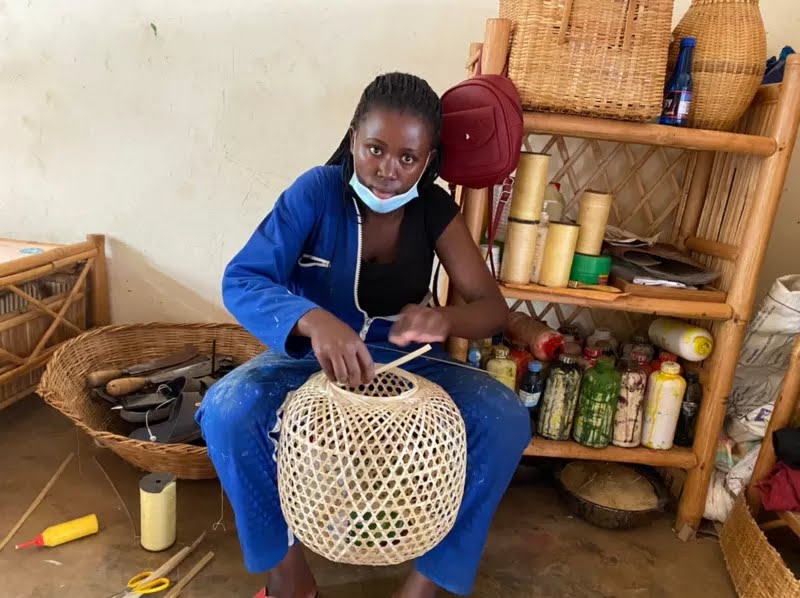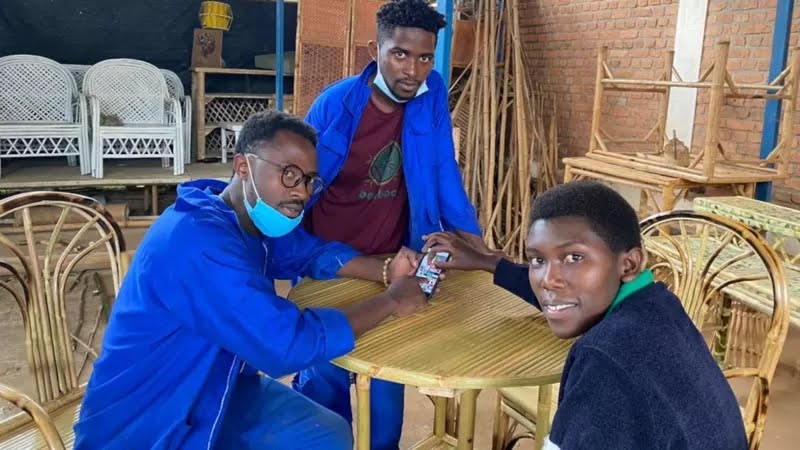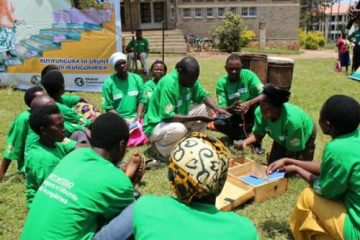Youth unemployment is a challenge facing Rwanda despite the government targeting to create 1.5 million jobs between 2017 and 2024.
The Rwanda state census of labor and employment published in May 2021, notes that unemployment rate is at 23%, and is higher in women (26%) compared to men (19%).
The main problem is the fact that Rwanda suffers from serious deficiencies in terms of trained human capital and this is more so for the technical professions. The impact of the 1994 Tutsi Genocide, which resulted in the massive loss of an educated and skilled workforce, further compounded the problem. As a result, this has posed a great threat to Rwanda reaching its Vision 2020 targets.
To solve the problem of unemployment among the youth, growing number of Rwandan youth have turned to bamboo furniture making and weaving business after skills training by Chinese bamboo experts in a bid to tackle youth unemployment challenges in Rwanda, a landlocked country in East-Central Africa.

Chinese bamboo processing center rise in Rwanda
The Bamboo processing (furniture making and weaving) training center is located in Masaka. Incubation Business experts of the China-Aid Rwanda Bamboo Team have been undertaking training projects about bamboo cultivation, processing and utilization in Rwanda since 2009 and more than 3000 people have been trained by now.

“The Chinese experts introduced bamboo cultivation and processing in our country. They supported us with bamboo processing equipment and trained us on how to cultivate bamboo, harvest it and process it into final products for home use such as furniture, baskets, lamp holders, decorations, toothpicks and among others,” Irenee Gumyushime, one of the trainees at the center revealed.
He said that bamboo processing has enabled him and his colleagues to acquire the necessary skills and expertise to be self-employed which is a key factor in reducing youth unemployment in the country.
“The Chinese experts taught us bamboo processing skills and I am now an expert in furniture making. I am also a trainer at the center. I thank the Chinese experts for their efforts in making our lives better through this training,” said Gumyushime.
Gumyushime said that at first they were 20 students at the center engaged in bamboo processing and among those, nine were women.
According to him, students at the center are capable of producing various types of furniture for home and office, or other areas and there is already a market for bamboo products in Rwanda.
“From bamboo processing, I am able to earn income to sustain my livelihood and at the same time I am saving the environment,” said Gumyushime.
Jean de Dieu Niyonkuru, another student at the center, said that he specializes in bamboo furniture making after learning from Chinese bamboo processing experts.
“I joined this center in 2015 where I was trained by the Chinese experts in bamboo processing for a period of six months. I also spent another three months on hands-on training while receiving mentorship support from the Chinese,” said Niyonkuru. “The Chinese also offered me an opportunity to go to China to get further training on bamboo processing. I am now doing very well. There is good business in bamboo products.”
Niyonkuru attributes all his success in bamboo furniture making to great expertise training by the Chinese experts.
“All my home furniture, arts and crafts are made in bamboo because I have a great passion for bamboo products. My livelihood depends on bamboo processing. I thank the Chinese for supporting me and my colleagues to improve our livelihoods through bamboo processing,” said Niyonkuru.
Yu Qinhong, a Chinese expert at the center, said that he has trained Rwandan students at the center on how to make quality products from bamboo to attract more customers.
“Rwanda is suitable for developing the bamboo industry. They have bamboo raw materials and a large population of young people and Rwandans like the bamboo products,” said Yu.
Yu reckoned that Rwanda’s dry climate is favorable for bamboo furniture, which keeps the mold away from the bamboo furniture.
The production process by pellet machine
The bamboo slag transported into the particle factory is crushed into appropriate size, and the processed bamboo chips are dried and sent to the bamboo pellet machine to be pressed into particles. The newly extruded bamboo particles are cooled and solidified into solid and strengthened. At the same time, after screening, bamboo particles are separated and then packaged, stored or transported.
The manufacturing of bamboo timber involves many steps such as; raw material quality check, cutting off bamboo to length and split for processing, bamboo strip, bamboo strip double-sided planning (removing bamboo green and yellow), steaming (insect prevention and mildew prevention treatment) or carbonization and coloring treatment, drying, bamboo strip fine planning, selection of bamboo strips, hot pressing and gluing, fixed length cutting off, plate separation, deburring, sanding, painting and finished product inspection.
The outcome
“I have been here for over a decade. I have deep feelings for Rwandans. From the beginning, there was not a single bamboo, our country spent a lot on training, and I have the obligation to consolidate the aid results,” said Yu. “I am happy to see the fruit of China-aid work that the bamboo production and weaving develop into an industry which allows more young people to earn money.”
A lot of new concepts and technologies have been brought in, transferred, innovated, incubated, utilized for training and applied in Rwanda from China, which helps Rwanda to establish 2 industry-scale systems of multiple-function-oriented bamboo plantation and high-value and semi-mechanization bamboo processing. All those achievements pioneered in Africa, particularly in Rwanda, contribute a lot to the transformation of Rwanda’s bamboo sector from a livelihood-oriented natural bamboo scenario into a commercial industry for people’s wellbeing.
For now, some of the youth confirm that bamboo is a source of employment, livelihood, and economy after being taught bamboo processing and are now teaching it to others in Kigali City.
Around 40 micro-enterprises on bamboo processing have been created and made a lot of contributions to job generation, particularly for the women and youth since 2018.
Mr. Mico Oscar Nzeyimana, 24, participated in the 3-week-long Technical Training Workshop conducted in Kigali in 2018, ranked first in the west province and fourth in Rwanda in the competition of Rwanda Youth Entrepreneurship for Self-reliance held by Rwanda government and UNDP in later 2018. He won a Connekt Award and bonus of US $ 1,000 for his successful creation and operation of a bamboo micro-enterprise which employs over 20 local persons and for his wonderful bamboo product designs.
Delphine Uwera,25, is another student who also studied bamboo processing at Masaka Business Incubation Center in Kigali City and is now doing the job as her daily living business.
Currently, Uwera and other two co-workers own a business company which is called “All is Bamboo” that means “Byose ni Bamboo” in Kinyarwanda.
Denise Igirimbabazi, a co-worker, says the market for their products is slowly becoming available. “On a monthly basis we can sell 60% of what we do, even though it was very small, we have a hope that this rate will keep increasing as the first time requires to inform people about the product” She says.
“When you tell people that the bamboo product is better than plastic, they witness it themselves. This way saves our environment and it usually looks nice physically” Uwera added.
Uwera says that every one of the team tries her best to widen the market and inform people about what they do as a sustainable way of keeping and increasing their clients.
“Now I can’t leave here to the city without carrying something from a bamboo and there I get three contacts [of people willing to buy] or those who are interested in knowing our workplace.
Moreover, buyers of bamboo products are on the rise due to the efforts made by the manufacturers, and the fact that plastics are being cut in Rwanda.
Obstacles and limitations
Gumyushime pointed out that they are now facing a challenge of getting new equipment for bamboo processing, because the existing equipment is old and worn-out, saying that the China-Aid Rwanda which has been supporting them has since phased out.
Moreover, bamboos are fast growing and early maturing but lack of proper management of bamboo resources is leading to rapid reduction of the existing bamboosetum. Another issue is that bamboo propagation through seeds is limited due to long flowering cycle of up to 120 years, seed sterility and short seed viability. Infrequent and unpredictable flowering events coupled with peculiar monocarpic behaviour that means flowering once before culm death, and extensive genome polyploidization are additional challenges for this woody group as stated by Chinese experts.
Similarly, vegetative propagation by cuttings, offsets and rhizomes are also inadequate to cope up with the demand of planting stock due to large propagule size, limited availability, seasonal dependence, low multiplication rate and rooting percentage.
Bamboo also requires preservation. Bamboo shrinks much greater than any other type of timber especially when it loses water. Bamboo should be sufficiently treated against insect or fungus attack before being utilized for building purposes.
The Government contribution
Nshimiyimana Sypridion, the Acting Director General of the National Forestry Agency, said that bamboo cultivation and processing was one of the reasons why the Chinese company was given a shore by the Rwandan lakes to plant bamboo that will be used to make various materials.
Returning to the specifics of the bamboo being planted, Nshimiyimana said it was the most productive crop in Rwanda.
“We are confident that the agreement reached by the Government of Rwanda with the company will be fruitful,” he said.
The bamboo sector is developing in Rwanda. The Rwanda Ministry of Environment and the Rwanda Development Board(RDB) have just signed an agreement with East Africa Bamboo Forest Industry for the creation of 2,300 hectares of bamboo in the districts of Kigali, Bugesera, Ngoma and Rwamagana.
By now, bamboo plantation in Rwanda covers 4382 hectares of land surface, corresponding to 1.82 percent of the total national forest cover.
By now, in Rwanda there are a variety of bamboo species, including Bambusa vulgaris, Arundinaria alpine and Oxythenanthera abyssinica. A study by Ruhande Arboreum has shown that Dendrocalamus giganteus is another species that can grow well in Rwanda.








